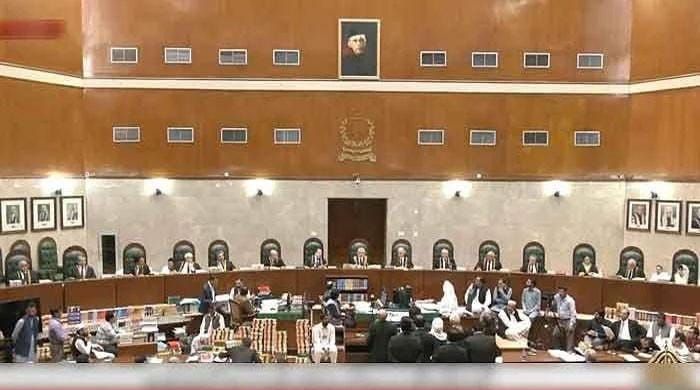Written order on KP govt petition: Livestreaming may be misused for ulterior purposes, hence plea dismissed, says SC

Source: The News International
ISLAMABAD: The Supreme Court (SC) has held that it is its exclusive domain to allow or decline live broadcast of a case, as in livestreaming cases, there is always a possibility that the facility may be misused or exploited for ulterior or personal purposes.
A five-member larger bench of the apex court, headed by Chief Justice Qazi Faez Isa, Saturday issued a written order of May 30 in an Intra-Court Appeal of the federal government against its decision striking down some of the amendments made to the NAB law. Other members of the bench included Justice Aminuddin Khan, Justice Jamal Khan Mandokhel, Justice Athar Minallah and Justice Syed Hasan Azhar Rizvi.
"We would like to add that while a request to live broadcast or livestream may be submitted, and may also be objected to, it is clarified that this, as matters presently stand, is in the exclusive domain of this court," the court held.
The court noted that when the head of a political party wants to be heard, who is not an advocate of this court, there is a real probability that these hearings may be used for political purposes and point scoring and in respect of matters which do not concern these appeals.
"This was a paramount consideration when we had dismissed the application and our apprehension proved correct later in the day when Mr Niazi addressed this court (30 May 2024) as he also mentioned other cases, general election held on 8 February 2023, a commission of inquiry and his incarceration; all these matters have nothing to do with the subject matter of these appeals," said the written order.
The court, in response to an application, filed by Advocate General Khyber-Pakhtunkhwa (KP), seeking livestreaming of the court proceeding in ICA of federal government, held that the only reason given in support of the application was that the "non-live showing of only the above mentioned case amongst others is discrimination".
"However, the reason is factually incorrect because only very few cases have been/are livestreamed," says the written order, adding that there are also instances of cases which were initially livestreamed, but in the interest of justice, it was discontinued.
The court noted that the application also does not cite any law in its support, adding that the learned Advocate General surely must know that Article 25 of the Constitution stipulates that all citizens are equal before the law and are entitled to equal protection of law, but the application does not say how the government of Khyber Pakhtunkhwa is being denied equality or equal protection of law. "Therefore, on this ground alone, the said application could be dismissed, but we did not do so and have decided it on merit," says the written order.
"However, in live-streaming cases, there is always a possibility that the facility may be misused or exploited for ulterior or personal purposes," the written order said, adding that there is also the possibility of grandstanding while the nation watches. This court must be vigilant against such misuse and/or exploitation.
On 30 May 2024, the court held that Mr Niazi requested access to counsel and that he wanted to consult with Senior Advocate Khawaja Haris Ahmad. "We directed that whenever the said learned senior advocate wants to, he, along with two other lawyers, may meet Mr Niazi with regard to these appeals," says the written order, adding that since Mr Niazi is now represented, he need not be provided video-link facility; however, this facility is being continued.
The written order further stated that the KP government was not arrayed by Mr Niazi as a party in CP No. 21/2022, nor did it seek to be arrayed as a party and, it did not participate in a single hearing. "Since it was not a party to CP No. 21/2022, the KP government was not arrayed as a party in these appeals," the written order stated, adding that the public had shown little or no interest in the matter of whether the amendments made to the National Accountability Ordinance, 1999 were sustainable on the constitutional plane, nonetheless this Court, on its own volition was livestreaming the hearing of these appeals.



